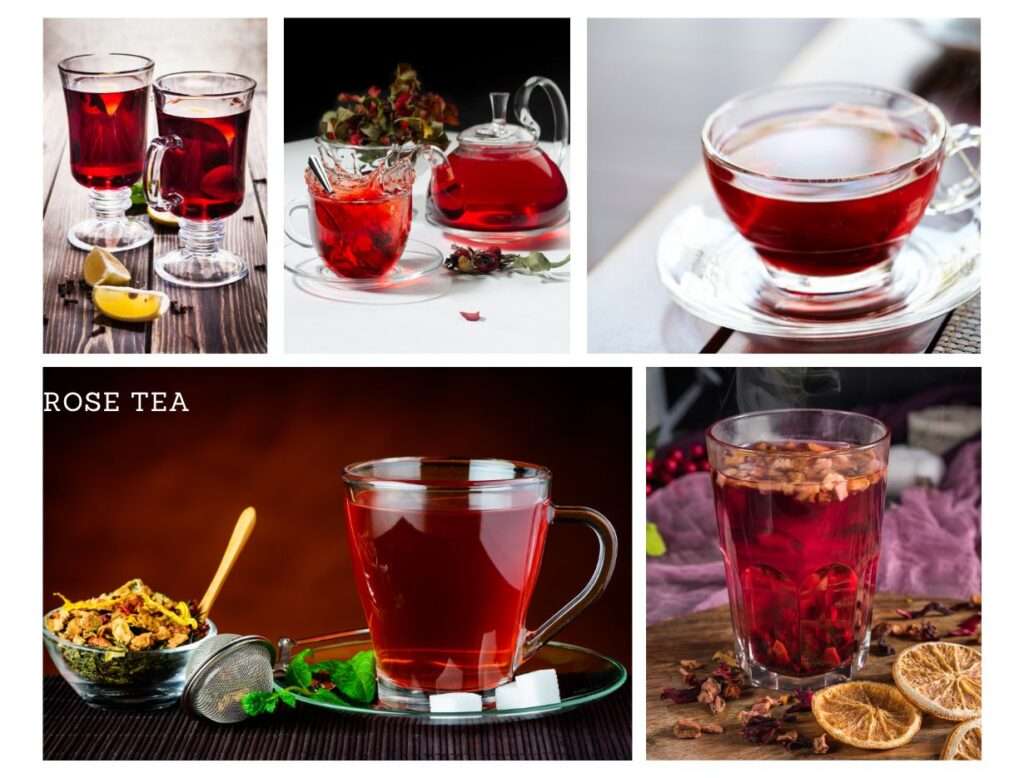Rose tea benefits is a popular beverage made from the petals of the rose plant. It is known for its delicate flavor and aroma, as well as its potential health benefits. Some people believe that drinking rose tea can help to reduce inflammation, improve digestion, and boost the immune system. However, it is important to note that more research is needed to confirm these potential benefits. Additionally, rose tea may also have some side effects, such as allergic reactions in people who are sensitive to roses. It’s always best to consult with a medical professional before incorporating any new dietary supplement into your regimen.
Roses are among the most beautiful and romantic flowers on the planet. Simply having these bright flowers around enhances the ambiance.
Roses have numerous applications. It is most commonly found in perfumes, face masks, skin care products, essential oils, and rose water. Roses are very gentle on our skin and can be used on a daily basis, even on sensitive skin. I, like many others, adore these red roses. The only thing you should be aware of is that if you are allergic to it, it may cause some allergic reactions in your body.
Benefits and Applications of the Floral Favourite, Rose Tea
The world’s most popular flowers include roses. These flowers, which are adored for their subtle romantic undertones and their delicately sweet aroma, also produce an outstanding herbal tea. Rose tea is a herbal tisane that is ideal for relaxing on your back patio or while reading in the sun. Use this helpful guide to learn more about rose tea and its various applications.
What Exactly Is Rose Tea?
Rose tea is a herbal tea made from various parts of the rose plant, including rose petals, rose buds, and rosehips. To make floral-flavored teas, the tea is frequently blended with true tea leaves such as green tea and black tea. Rose tea blends are also made with other herbal teas like chamomile, hibiscus, and rooibos.
There are also various types of rose tea based on the type of rose. Red rose tea, damask rose tea, and other varieties fall into this category. Rose tea can be made with fresh or dried rose flower petals, as well as rose extracts. It is available as a loose leaf tea as well as in tea bags.
The flavour of rose tea varies depending on the tea’s origin. Rosehip tea has a fruity flavour with floral undertones. It’s a lively tea with a sweet and citrusy scent. Rose petal tea has a delicate aroma and a mildly sweet flavour. It has a light body and lingering aftertaste.
Rose tea contains no caffeine when made from any part of the rose plant. Caffeine levels in flavoured rose teas with true tea leaves, such as oolong tea and pu-erh tea, range from mild to moderate.

Rose tea uses
A number of potential health advantages have been connected to rose tea. There are still many reasons to drink rose tea, even if study in these disciplines is still ongoing and the findings are still ambiguous. Here are a few of the most popular uses and health advantages of rose tea.
Relieve Pain
The act of enjoying a great cup of tea is calming. Each sip of a warm herbal tea seems to instantly relieve the tension and pains of the day. Research suggests that specific types of pain, such as menstrual cramps, may benefit from rose tea in particular. According to a 2005 study, rose tea greatly reduced the pain that goes along with dysmenorrhea (1). The tea might lessen inflammation and lessen the feelings of menstruation pain.
Skin Care
One of the best methods to safeguard and enhance skin health is to stay hydrated. Compared to supple, moisturised skin, dry, undernourished skin is more likely to break, develop wrinkles, and have other flaws. A cup of rose tea tastes better than a simple glass of water and is better for you than sugary soft beverages. The rose tea’s ability to keep you hydrated will help your skin appear its best.
Rose tea’s anti-inflammatory and antioxidant effects, according to a study in the International Journal of Molecular Sciences, aid to improve the appearance of skin. According to the study, the key agents causing these advantages to support skin health include the presence of antioxidants such polyphenols and catechins as well as vitamins like vitamin C and vitamin E.
Additionally, antioxidants help to maintain healthy skin by reducing oxidative stress brought on by free radicals. Fine lines, wrinkles, and skin discolouration can all be a result of this skin damage. Free radicals can be neutralised and the harm they cause can be reduced by the antioxidants found in both fresh and dried rose petals.
Immune Assistance
Maintaining hydration also supports and protects the health of the immune system. You may keep your body’s defence mechanisms focused on warding off germs that can make you sick by drinking a couple cups of tea per day to help you stay hydrated. Additionally, certain varieties of rose tea include significant amounts of vitamin C, which could provide short-term relief from the symptoms of the common cold and flu (5). Vitamin C content in rosehip tea is higher than in rose petal tea, and fresh rosehips are often preferable to dried ones.
Digestive Assistance
When combined with a nutritious diet and moderate exercise, rose tea may support weight loss objectives and digestive health. The digestion process depends on the vitamins and antioxidants in the tea. The tea is a fantastic substitute for sugary sports drinks that might cause weight gain. To help you control your calorie consumption, substitute a cup of rose tea with sugary beverages.
Women’s Wellness
By avoiding or treating some mild urinary tract infections, rose tea may promote women’s health. Remaining hydrated is the key to obtaining these advantages. Keep yourself hydrated because it’s one of the greatest strategies to treat UTI symptoms. You can achieve it by consuming rose tea. Vitamin C and flavonoids in rose hips were discovered in one 2017 study to help prevent recurrent UTIs. According to the study, rose hips were much more effective at preventing UTIs than a starch placebo.

Methods for Making Rose Tea
Tea bags, loose tea, or fresh petals from your garden can all be used to make rose tea. In a sizable teapot or electric kettle, bring spring or filtered water to a rolling boil. For every eight ounces of water, add one teaspoon of rose hips or petals. Use an infuser to steep the rose tea in the hot water for 5 to 7 minutes. Limit the steeping time to 3 to 5 minutes when brewing a herbal tea blend with black tea or any robust genuine tea. Pour the hot rose water tea into a teacup after removing the strainer from the water. If you’d like, add sweetener, then indulge.
Rose tea side effects
Rose tea has few negative effects and is safe to consume. An allergic reaction is rose tea’s principal negative side effect. If you are allergic to roses or other members of the rose family, avoid drinking this tea. If you begin to sneeze, have trouble breathing, or have an itchy throat, stop drinking this tea.
The FDA does not approve the use of rose tea in the treatment of any ailments. Always consult with a medical professional before drinking herbal teas as they may interact with certain medications.



